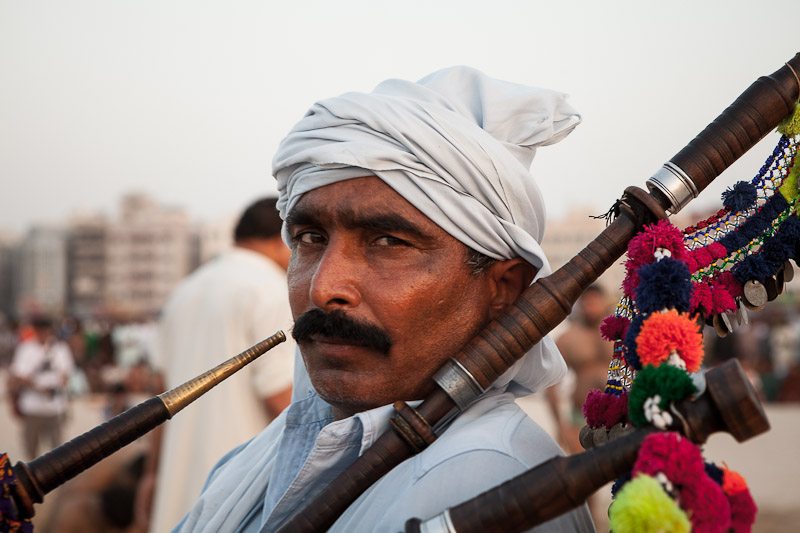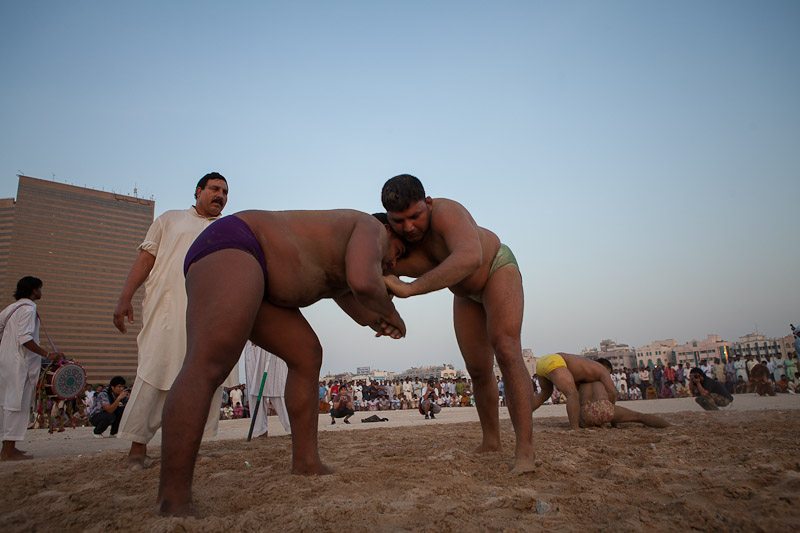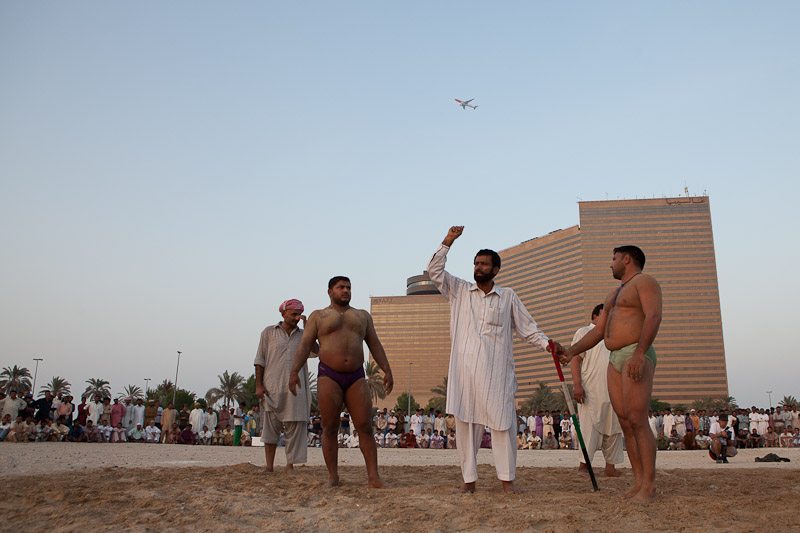Enter the khala
Kushti in Dubai

“Just head down to the fish market, then follow the groups of Pakistani men to find your way.” This was the directions to one of Dubai’s less-known Friday attractions: kushti or pehlwani, an age-old form of wrestling that is practiced all across the Indian subcontinent.
In Dubai, home to hundreds of thousands of Indian and Pakistani nationals (together they make up more than half the city’s population), the open-air kushti games draw crowds of spectators every week.

It’s only just turned September, and the city is still immersed in the summer heat. This Friday, as the time nears 5.30 in the afternoon, there’s a slight breeze from the ocean. Down by the water in Deira — one of Dubai’s oldest neighbourhoods, today distinctly South Asian — the evening life is slowly about to start. And, just like the directions indicated, there’s a large assembly of men wearing Pakistani clothes. They’re all walking in the same direction — towards the large, empty parking lot just in front of the Hyatt. In the middle of the sandy field is a ring of spectators, growing larger as more people join, waiting for the wrestling to start.

In the middle of the ring are men with colourful instruments, entertaining the crowds while they’re waiting. One of them beats a dhol drum rhythmically, another plays beautifully decorated bagpipes. There’s a man holding a long stick, who stands together with two others. “They’re senior wrestlers, whose role it is now to judge the game,” explains a man in the crowd. “People have respect for them, given their experience.” The man’s name is Khawaja Azad, and even though it’s his first time at this place — he only just arrived in Dubai from his native Pakistan — he’s a long-time kushti enthusiast.
“In Pakistan now, the sport is dying. People are not interested in it any more — they love cricket and football but that’s it.”
“You wouldn’t know it, but I come from a family of great wrestlers,” says Azad. “My great grandfather’s name was Ustad Kareem Bux Pehlwan Rustam-e-Hind. If you’d mention his name to someone from the old generation in India or Pakistan, they’d immediately know who he is.” Azad himself does not wrestle anymore — he’s too old and not in shape, he says. “I started going to the khala when I was young — in 7th grade. The khala — that’s the sand-filled pit where the wrestling takes place. Kushti is a honourable practice. People say that the wrestlers are illiterate and simple, but if you ask me, they’re sharp-minded. Their training is impressive: they can do hundreds and hundreds of repetitions of squats. And dand, our way of doing push-ups, which makes you very strong.”
All of a sudden, a man steps out from the crowd and starts jumping towards the khala. With energetic leaps and loud, short chants, he makes his way to the centre of the circle: he’s the first competitor of the day. From the opposite side, another man joins him. Both are without their clothes, wearing only short, tight cotton pants in bright purple and yellow. They’re called jangia, says Azad, and are held in place with the help of ropes. “The ropes are there to enable the wrestlers to take grips. They grab each other’s pants with one hand, which is called mursi,” he continues and points towards the two wrestlers. “Look at them now — the guy on top is trying flip the other around with his mursi.”

“Mashallah, mashallah! Very good that one!”
In a few minutes, he succeeds in wrestling down his opponent. When the lower part of the back touches the sand, the game is over. New wrestlers enter the khala, and the winner takes to wandering around the circle with spectators. “He goes around to ask the audience for a few coins,” says Azad. “These wrestlers are not sponsored by anyone, so people who come give them a few dirhams to keep the games going.” He looks around him in the crowd, with several hundreds gathered on the sandy field. “I’m very happy to see this,” he says. “In Pakistan now, the sport is dying. People are not interested in it any more — they love cricket and football but that’s it.”
True, kushti is losing popularity. It’s not like the old days anymore, when wrestlers like Azad’s grandfather were famous all over India and Pakistan. But the sport is still practiced, and young men continue to join India and Pakistan’s akharas, gyms where wrestlers live and train together. They still practice according to the sport’s age-old philosophies (its origins date back to the Moghul area, when it was developed through a synthesis of Iranian and Indian martial sports) which include spiritual notions and specific dietary rules. Undefeated masters hold the title Rustum-i-Hind or Rustum-i-Pakistan.

Its origins date back to the Moghul area, when it was developed through a synthesis of Iranian and Indian martial sports.
Down at Dubai’s kushti field, the temperature has dropped a degree or two. The dusk is starting to fall. The last game of the evening is just starting: two new men enter khala, with brightly coloured pants and their gazes fixed at each other. They grab handfuls of sand and rub it onto their skin, sweaty from the heat and the humidity. “It’s for them to get a better grip,” says Azad. “The sand, which is mixed with ghee or oil, prevents them from slipping.” The last game is over quickly — all of a sudden, one of them flips the other over on his back. “Mashallah, mashallah! Very good that one!” shouts Azad with a smile.
The crowds begin to disperse. Some gather around the wrestlers, who share their comments on tonight’s wins and losses, others make their way back to the city streets. The drumming and cheering quiets; the air is instead filled with the voice of the muezzin at the nearby mosque. It’s wrestling break — until next Friday.
Edited by Christine Riedel.







